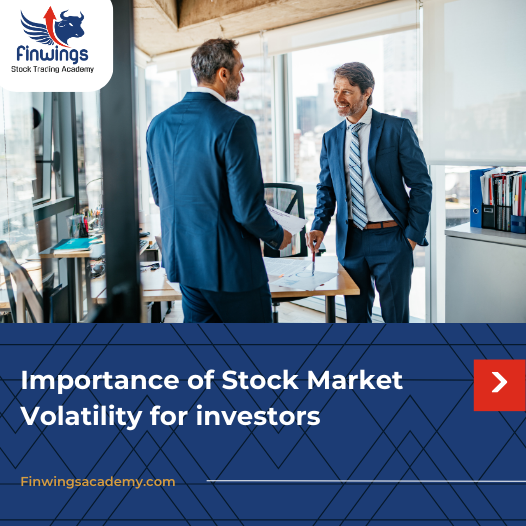Importance of Stock Market Volatility for investors
The degree to which the prices of stocks change over time is a measure of stock market volatility. Stock values might fluctuate more drastically, both up and down, in a more volatile market whereas they are more stable and do not vary as much in a less volatile market. Investors need to understand the idea of volatility clearly because it significantly affects the returns on their investments. Long-term returns on investments may be higher for those investors who can tolerate risk in a volatile stock market. Conversely, those who choose safer investments stay away from fluctuating markets. Although, share market training in Ahmedabad can give you a clear picture of trading in high volatile markets, you need a lot of practice to do that. In this article, we will discuss the importance of stock market volatility for investors
Causes of Stock Market Volatility
In terms of economic variables such as unemployment, inflation, and interest rates. It may significantly affect the volatility of the stock market. Variations in these variables may lead to swings in the market.
Stock market volatility can also be brought on by geopolitical events like trade conflicts, wars, or political unpredictability. India’s share market has experienced volatility recently, driven by both local and international causes. The world economy may be impacted by several events, which may cause changes in the market.
There are company-specific factors that can also impact stock market volatility, such as financial performance, leadership changes, or scandals. The broader market may be impacted by a company’s stock rising or falling in response to news or events about it.
Impact of stock market volatility on investors
Investors may experience both positive and negative outcomes from stock market volatility. Panic and worry brought on by the emotional effects of a volatile market might result in rash decisions like selling off investments. It’s critical to remain composed during these situations and refrain from acting too quickly.
Impact on the portfolio is another important factor. A portfolio may experience brief losses during a market crash. However, market swings may have less of an impact on investors who keep a diversified portfolio that includes a variety of stocks, bonds, and other assets. Lastly, for investors that view the long term, volatile times can present possibilities for rewards. Investing in solid companies with solid fundamentals may be a wise move at this time.
In conclusion, volatility is an unavoidable part of investing, and it’s critical to understand the emotional toll it takes on investors and the influence it has on their portfolios.
How can investors deal with sharp market volatility?
You can reduce your risk exposure and increase your chances of making long-term rewards by spreading your investments over a range of assets. This involves distributing your investments throughout several sectors and asset types, including commodities, stocks, and bonds.
You can lower your risk exposure to particular assets or markets by using hedging. These allow you to sell your equities at a predetermined price in the event that their value declines.It reduces losses during market fluctuations, but keep in mind that there is a price. You can learn this in good stock market courses in Gujarat.
Always do value investing which means looking for stocks with robust growth potential that are undervalued by the market. You can make better investing selections if you pay more attention to a company’s long-term prospects than to its short-term volatility.
You might need to rebalance your portfolio to make sure it remains in line with your risk tolerance and investing goals if the market and your ambitions for your money change.
Tag:investors, Stock Market









